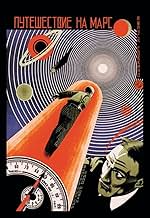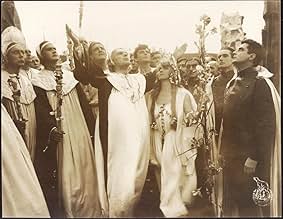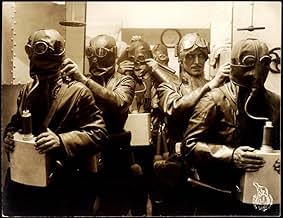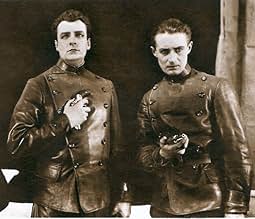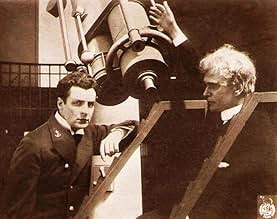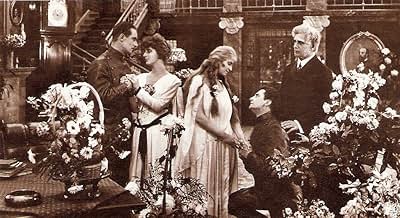A group of researchers from Earth travel in a spaceship to Mars, where, to big surprise, they find a peaceful vegetarian and pacifist civilization.A group of researchers from Earth travel in a spaceship to Mars, where, to big surprise, they find a peaceful vegetarian and pacifist civilization.A group of researchers from Earth travel in a spaceship to Mars, where, to big surprise, they find a peaceful vegetarian and pacifist civilization.
- Director
- Writers
- Stars
Nils Asther
- Wounded Martian Citizen
- (uncredited)
Alfred Osmund
- Martian Priest
- (uncredited)
- Director
- Writers
- All cast & crew
- Production, box office & more at IMDbPro
6.4898
1
2
3
4
5
6
7
8
9
10
Featured reviews
Danish science fiction that established an oft-imitated premise.
Avanti Planeteros (Gunnar Tolnaes) is a soldier returned home after the war. His astronomer father (Nicolai Neiiendam) convinces him that the future is in the stars, so Avanti teams with Dr. Krafft (Alf Blutecher), who is betrothed to Avanti's sister Corona (Zanny Petersen), to build a spaceship capable of reaching Mars. They construct something that looks like a small, metal blimp with bi-plane wings, and along with a crew of about 8 other guys, they set off for Mars. Once there, they discover an idyllic paradise of robe-wearing, God-loving vegetarians. And of course a Martian woman (Lilly Jacobson) who immediately falls in love with Avanti. Also featuring Frederik Jacobsen as Professor Dubius.
This had to have been silly stuff even in 1918. After the end of WWI I'm sure that most Europeans were looking for a peaceful new way of life as far from war and misery as possible. The Martians aren't aliens as much as idealized humans, looking a bit like Ancient Greeks but with Egyptian ankhs on all of their clothing (Ancient Aliens?!?). The acting is hammy, the effects as primitive as one would imagine, and the story both juvenile and overlong. However, this is an important foundational step in the genre, which is why it's one of the 101 Sci-Fi Movies to See Before You Die.
This had to have been silly stuff even in 1918. After the end of WWI I'm sure that most Europeans were looking for a peaceful new way of life as far from war and misery as possible. The Martians aren't aliens as much as idealized humans, looking a bit like Ancient Greeks but with Egyptian ankhs on all of their clothing (Ancient Aliens?!?). The acting is hammy, the effects as primitive as one would imagine, and the story both juvenile and overlong. However, this is an important foundational step in the genre, which is why it's one of the 101 Sci-Fi Movies to See Before You Die.
A Pacifist Sci-Fi Film
The early first days of the last century were times of great human curiosity about new technologies and the marvellous possibilities in the world of science; startling discoveries and new inventions set the world on the path to modernity. Unfortunately, this time of enlightenment also coincided with terrible conflicts and war, mankind at its worst.
That human duality is very well reflected in the Danish film "Himmelskibet" (1918), directed by the great director Herr Holger-Madsen. It is a sci-fi film that includes a clear and sincere pacifist claim.
The film tells of the eagerness and hardships of the sea captain Herr Avanti Planetaros, now reconverted into a space captain, and his project of a trip to Mars. Before embarking on his particular space odyssey, Captain Planetaros will have to bear the incredulity and the scorn of many conservative astronomers, especially Professor Dubius ( ah, what a proper name ) . In spite of such indifference and after many troubles and years of work, the spaceship "Excelsior" is finally constructed and Captain Planetaro's trip to Mars goes from dream to reality. Once on Mars, Captain Planetaros and his crew finds an advanced society in which peace is a way of life among its citizens.
Filmed during the terrible years of WWI, "Himmelskibet" was obviously influenced by that devastating conflict that destroyed Europe during four miserable years. The message of peace and morality comes from the archaic but advanced Martian society which hopes to influence the Terrestrial civilization and wean it from such bad habits as violence, wine and canned meat.
So, Martians will show Terrestrials the way to achieve a better society on Earth with pacifist messages reminiscent of those of religion and pious morality, and in stark contrast to the bad behaviour on earth which has wrought so much unhappiness through the centuries. The Martians hope their philosophy will be spread on Earth once Planetaros and his crew returns home.
In these modern times in which the movies are full of technological magic, the special effects in "Himmelskibet" are primitive by comparison but are still full of naive charm. In fairness, longhaired and modernen youngsters should remember that Herr Holger-Madsen was also a very modernen youngster in those olden times, a director who was innovative, imaginative and influential.
It must be said too that this Herr Graf thought that instead of journeying through space to Mars, Captain Planetaros may have travelled back in time to ancient Greece since the Martian citizens wear white and classical robes so reminiscent of the Hellene imaginarium ( Martians may look like Greeks but in comparison they are crashing bores ). However, in spite of its naive ways, the film effectively conveys its important message and one that is no less valid today where mankind still dreams of a world of peace and cooperation. Alas, even after Captain Planetaros' trip to Mars, the world seems not to have grown in wisdom.
And now, if you'll allow me, I must temporarily take my leave because this German Count must make love to one of his Teutonic heiress and war with the other one.
That human duality is very well reflected in the Danish film "Himmelskibet" (1918), directed by the great director Herr Holger-Madsen. It is a sci-fi film that includes a clear and sincere pacifist claim.
The film tells of the eagerness and hardships of the sea captain Herr Avanti Planetaros, now reconverted into a space captain, and his project of a trip to Mars. Before embarking on his particular space odyssey, Captain Planetaros will have to bear the incredulity and the scorn of many conservative astronomers, especially Professor Dubius ( ah, what a proper name ) . In spite of such indifference and after many troubles and years of work, the spaceship "Excelsior" is finally constructed and Captain Planetaro's trip to Mars goes from dream to reality. Once on Mars, Captain Planetaros and his crew finds an advanced society in which peace is a way of life among its citizens.
Filmed during the terrible years of WWI, "Himmelskibet" was obviously influenced by that devastating conflict that destroyed Europe during four miserable years. The message of peace and morality comes from the archaic but advanced Martian society which hopes to influence the Terrestrial civilization and wean it from such bad habits as violence, wine and canned meat.
So, Martians will show Terrestrials the way to achieve a better society on Earth with pacifist messages reminiscent of those of religion and pious morality, and in stark contrast to the bad behaviour on earth which has wrought so much unhappiness through the centuries. The Martians hope their philosophy will be spread on Earth once Planetaros and his crew returns home.
In these modern times in which the movies are full of technological magic, the special effects in "Himmelskibet" are primitive by comparison but are still full of naive charm. In fairness, longhaired and modernen youngsters should remember that Herr Holger-Madsen was also a very modernen youngster in those olden times, a director who was innovative, imaginative and influential.
It must be said too that this Herr Graf thought that instead of journeying through space to Mars, Captain Planetaros may have travelled back in time to ancient Greece since the Martian citizens wear white and classical robes so reminiscent of the Hellene imaginarium ( Martians may look like Greeks but in comparison they are crashing bores ). However, in spite of its naive ways, the film effectively conveys its important message and one that is no less valid today where mankind still dreams of a world of peace and cooperation. Alas, even after Captain Planetaros' trip to Mars, the world seems not to have grown in wisdom.
And now, if you'll allow me, I must temporarily take my leave because this German Count must make love to one of his Teutonic heiress and war with the other one.
An intelligent (though dated) comment on the world.
The view of the world in this movie is clearly dated, but as the movie is from 1918, it's hard to put it against it. What is more impressive is everything it does right. This is not a movie using science fiction as a gimmick - it uses the genre to explore ideas about the time it was made. In the end of the first world war, here's a movie exploring if mankind can live in peace, how we treat our prisoners, how life in a submarine (here: spacecraft) can affect ones mental health, how pushing science forward is a global affair, and can unite different parts of the world, and so on.
While I am not sure just how much the general public knew about astronomy - this movie presents the mission to mars in a way that seems realistic. It takes time, people doubt it, and it takes a toll on the members. They point out where mars will be as they leave Earth, and where it will be when they arrive. The spacecraft itself is like a submarine with a propeller and wings. Mars itself I am sure was quite a mystery back then, so the fact that they made it Earth-like is very understandable. It also opened up for them using Mars and Martians in a way that let the film makers comment on the people of Earth.
The movie is not subtle in the message it is conveying: people on earth should stop with wars and violence and rather go with love. In the end of the most gruesome war in world history up till that point - that sounds like a good message.
The worst part about this movie is the one evil character in it. He serves little purpose, and undermines the underlying message of the film that humans are capable of being good.
While I am not sure just how much the general public knew about astronomy - this movie presents the mission to mars in a way that seems realistic. It takes time, people doubt it, and it takes a toll on the members. They point out where mars will be as they leave Earth, and where it will be when they arrive. The spacecraft itself is like a submarine with a propeller and wings. Mars itself I am sure was quite a mystery back then, so the fact that they made it Earth-like is very understandable. It also opened up for them using Mars and Martians in a way that let the film makers comment on the people of Earth.
The movie is not subtle in the message it is conveying: people on earth should stop with wars and violence and rather go with love. In the end of the most gruesome war in world history up till that point - that sounds like a good message.
The worst part about this movie is the one evil character in it. He serves little purpose, and undermines the underlying message of the film that humans are capable of being good.
A TRIP TO MARS (Holger-Madsen, 1918) **1/2
The only time I've seen this rare Scandinavian foray into sci-fi territory mentioned anywhere - prior to its DVD availability courtesy of the Danish Film Institute - was in a literate appraisal of the genre by noted critic Philip Strick (who, incidentally, passed away recently). This alone would make it interesting and a film to seek out - but, alas, while undeniably good to look at (a traditionally Danish quality, I might add), dramatically it turned out to be a major disappointment!
Apart from being technically stilted and plagued by the exaggerated gestures of the actors (a well-established liability of most Silent-era product), it also presents a totally different view of Mars and its inhabitants to the one we've grown accustomed to seeing in later American films tinged by paranoia. Not only is there no concentrated effort to show an alternative landscape for the red planet, but the Martians themselves are merely benevolent humans fitted in Roman-era attire (with the addition of some outlandish accoutrements): apparently, they were once as 'barbaric' as us but have gradually attained enlightenment - and, though their language is different from that of their earthly visitors, they're somehow able to transmit their thoughts to them! In essence, it's clear that the film is infused with the last remnants of 19th century Romanticism (some of the title cards are unbelievably hokey) which Weimar Germany and, then, the Wall Street crash helped eradicate - leading to a change in the general attitude of cinema.
The ultimate intent of the picture, obviously, was a general plea for tolerance and understanding (WWI was still raging when the film emerged); however, while certainly watchable (and short enough at 81 minutes not to lapse into boredom), the almost total lack of tension between the inhabitants of the two planets - where, back home, it's represented by the ripe but highly amusing villainy of a Mephistophelean character who, eventually, gets his just desserts by way of a lightning bolt! - makes for an altogether dull narrative. Besides, virtually none of the occupants of the vessel - which itself constitutes nothing more fanciful than an airship - who have been assembled from all over the world (and are contemplating mutiny against their stoic captain when the journey takes longer than expected!) get to do much of anything once they land on Mars!!
Apart from being technically stilted and plagued by the exaggerated gestures of the actors (a well-established liability of most Silent-era product), it also presents a totally different view of Mars and its inhabitants to the one we've grown accustomed to seeing in later American films tinged by paranoia. Not only is there no concentrated effort to show an alternative landscape for the red planet, but the Martians themselves are merely benevolent humans fitted in Roman-era attire (with the addition of some outlandish accoutrements): apparently, they were once as 'barbaric' as us but have gradually attained enlightenment - and, though their language is different from that of their earthly visitors, they're somehow able to transmit their thoughts to them! In essence, it's clear that the film is infused with the last remnants of 19th century Romanticism (some of the title cards are unbelievably hokey) which Weimar Germany and, then, the Wall Street crash helped eradicate - leading to a change in the general attitude of cinema.
The ultimate intent of the picture, obviously, was a general plea for tolerance and understanding (WWI was still raging when the film emerged); however, while certainly watchable (and short enough at 81 minutes not to lapse into boredom), the almost total lack of tension between the inhabitants of the two planets - where, back home, it's represented by the ripe but highly amusing villainy of a Mephistophelean character who, eventually, gets his just desserts by way of a lightning bolt! - makes for an altogether dull narrative. Besides, virtually none of the occupants of the vessel - which itself constitutes nothing more fanciful than an airship - who have been assembled from all over the world (and are contemplating mutiny against their stoic captain when the journey takes longer than expected!) get to do much of anything once they land on Mars!!
A great early sci-fi
I don't know of any other full length science fiction film that was made before The Trip to Mars. So in that sense it's the first. I watched other silent sci-fi films from the beginning of the 20th century but all of them were no longer than 15 minutes, and this one was the first of that era that I took seriously.
It held my attention through the movie and it has some very nice and moving scenes. Despite being silent the makers managed to pack it with an interesting and engaging plot, good actors play, science fiction, drama, adventure and a love story. It has an amazing well-built spaceship and special effects are fairly good for the time. The film has very strong religious and Christianity-rooted undertones with a message of hope for humanity plagued with murder, hatred and deceit. Another surprise was that the film was nothing like many other sci-fi movies, most of which came out of Hollywood - just clichés that were about either aliens being vicious monsters, or some oversexed alien women, or an imbecile earth superhero. This one does offer the viewer a chance to engage his brain and heart which is probably more important that the above mentioned infantile and unintelligent consumer rubbish.
So it was quite an unexpected surprise to see such an old and yet very good film and I very much recommend it to any lover of science fiction who can be interested in the oldies just as much as the modern cinema and likes to get something out of film.
It held my attention through the movie and it has some very nice and moving scenes. Despite being silent the makers managed to pack it with an interesting and engaging plot, good actors play, science fiction, drama, adventure and a love story. It has an amazing well-built spaceship and special effects are fairly good for the time. The film has very strong religious and Christianity-rooted undertones with a message of hope for humanity plagued with murder, hatred and deceit. Another surprise was that the film was nothing like many other sci-fi movies, most of which came out of Hollywood - just clichés that were about either aliens being vicious monsters, or some oversexed alien women, or an imbecile earth superhero. This one does offer the viewer a chance to engage his brain and heart which is probably more important that the above mentioned infantile and unintelligent consumer rubbish.
So it was quite an unexpected surprise to see such an old and yet very good film and I very much recommend it to any lover of science fiction who can be interested in the oldies just as much as the modern cinema and likes to get something out of film.
Did you know
- TriviaReported by the British press in 1919 to have cost £20,000. After inflation this would be approaching £1.5 million in 2024.
- Quotes
Avanti Planetaros - Captain of the Space Ship: Glowing and calling planets... I am coming!
Details
- Release date
- Country of origin
- Official site
- Language
- Also known as
- Nebeska ladja
- Production company
- See more company credits at IMDbPro
- Runtime
- 1h 37m(97 min)
- Color
- Sound mix
- Aspect ratio
- 1.33 : 1
Contribute to this page
Suggest an edit or add missing content

